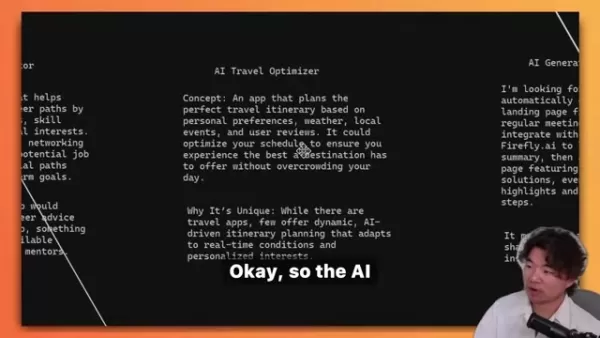AI Travel Planners Revolutionize Trip Planning by 2025
In 2025, the travel industry is experiencing a revolutionary shift thanks to artificial intelligence (AI). Gone are the days of endless scrolling through travel blogs and reviews. Now, AI travel planners are changing the game, making trip planning easier, more personalized, and incredibly enjoyable. These smart systems craft tailored itineraries, suggest unique activities, and streamline bookings, ensuring your next adventure is just a few clicks away.
The Rise of AI in Travel Planning
What is an AI Travel Planner?
An AI travel planner is a sophisticated software or app that uses AI to create customized travel itineraries. It takes into account your interests, budget, travel style, and desired activities, then taps into vast travel databases to recommend destinations, accommodations, and experiences. This smart approach not only saves you time but also helps you discover unique adventures that align perfectly with your travel goals.

Why are AI travel planners gaining such popularity? Let's dive into a few reasons:
- Personalization: They create itineraries that are uniquely yours, something traditional travel agencies often can't match.
- Efficiency: By automating the planning process, these tools save you hours of research and planning.
- Discovery: AI algorithms can find hidden gems and off-the-beaten-path experiences that resonate with your interests.
- Convenience: Many allow you to book everything from flights to activities directly through the platform.
How AI Travel Planners Work: The Core Components
The magic behind AI travel planners lies in their technology. Here's what makes them tick:
- Natural Language Processing (NLP): This allows the planner to understand your requests in everyday language, making the process as simple as chatting with a friend.
- Machine Learning (ML): The system learns from your interactions, improving its recommendations over time to better suit your preferences.
- Data Aggregation: Pulling from a wide array of travel data sources, these planners ensure you get the most current and comprehensive information.
- Recommendation Engine: It uses your preferences and data to suggest destinations and activities that you'll love.
- Booking Integration: Many planners connect directly with booking platforms, allowing you to finalize your plans without leaving the app.
Exploring Specific AI Travel Planning Tools
ChatGPT and Travel Planning: A New Frontier
ChatGPT, developed by OpenAI, is making significant inroads into the travel industry. Though not designed specifically for travel planning, its ability to generate human-like text makes it a fantastic tool for brainstorming travel ideas, crafting itineraries, and answering travel queries.
Here are some prompts to get the most out of ChatGPT for your travel planning:
- "Give me travel plans for a fun city in South America. I enjoy surfing, hiking, and socializing."
- "Suggest a three-day itinerary for a solo traveler interested in art and history in Rome."
- "What are some unique experiences in Kyoto, Japan, off the beaten path?"

While ChatGPT can generate creative and detailed itineraries, it's crucial to double-check the accuracy of its suggestions and use other resources for bookings and logistics.
Feature Benefit Idea Generation Provides creative and unique travel ideas based on user preferences. Itinerary Creation Generates detailed itineraries, including destinations, activities, and daily schedules. Information Access Answers travel-related questions and provides information on various destinations and attractions. Natural Language Understands and responds to user requests expressed in natural language, making it easy to use.
Automating Travel Workflows with Make
Make, formerly known as Integromat, is an automation platform that connects various apps and services to create custom workflows. In the realm of travel planning, Make can automate tasks like:
- Collecting user preferences using tools like Typeform.
- Generating personalized itineraries with ChatGPT.
- Distributing itineraries via email, SMS, or messaging apps like Slack.
- Creating a random trip planner based on hemisphere, continent, and activities.

By leveraging Make, you can build a fully automated AI travel planner that streamlines the entire process from gathering preferences to delivering a customized itinerary. Here's how to set it up:
- Set up a Typeform to collect user preferences like destination, travel dates, interests, and budget.
- Connect Typeform to Make to trigger a scenario when a new form is submitted.
- Integrate with OpenAI ChatGPT to send user preferences and generate a travel itinerary.
- Craft a detailed prompt for ChatGPT to ensure the itinerary is personalized.
- Use the Gmail module in Make to send the generated itinerary to the user's email.
How to Use AI Travel Planner
Step-by-Step Guide
Here's how to make the most of an AI travel planner:
- Access the Platform: Head to the AI travel planner's website or app. A stable internet connection is key.
- Create an Account or Log In: New users should sign up, while existing users can log in. Keep your account details updated for a personalized experience.
- Enter Travel Preferences: Be as detailed as possible to get tailored recommendations.
- Generate Itinerary: Hit the "Generate Itinerary" button, and let the AI do its magic.
- Review and Customize: Go through the itinerary and tweak it to fit your needs perfectly.
- Book Your Trip: Finalize your plans by booking flights, accommodations, and activities directly through the platform.
Pricing Plans for AI Travel Planner
Subscription Options
AI travel planners often offer various subscription plans to cater to different needs. These plans are a cost-effective way to access premium services while ensuring the platform remains sustainable.
AI Travel Planning: Weighing the Advantages and Disadvantages
Pros
- Highly personalized travel recommendations
- Significant time savings in planning
- Discovery of unique and off-the-beaten-path experiences
- Convenient booking integration
Cons
- Potential for inaccuracies or outdated information
- Risk of over-reliance on AI, reducing spontaneity
- Privacy concerns related to data collection and usage
- Limited ability to account for unforeseen circumstances
Core Features of AI Travel Planner
Key Functionalities
AI travel planners offer a range of features, including personalizing itineraries based on your interests, suggesting activities, and connecting you with third-party services for bookings.
Use Cases for AI Travel Planner
Use Cases
Whether you're planning a trip to a new country, seeking unique activities, or looking to automate the entire planning process, AI travel planners have you covered.
FAQ
How accurate are the AI travel recommendations?
AI travel recommendations are generally accurate due to the vast data and sophisticated algorithms used. However, it's wise to verify information, especially for real-time travel conditions.
Can I use AI travel planners for business trips?
Absolutely, AI travel planners can be tailored for business trips. Just input your specific requirements, like conference locations and preferred accommodations, to get relevant itineraries.
Are there any privacy concerns when using AI travel planners?
Privacy is a valid concern. Choose platforms with strong data protection measures and clear privacy policies to ensure your personal data is handled responsibly.
Related Questions
What are the potential pitfalls of relying solely on AI for travel planning?
While AI is a powerful tool, over-reliance can lead to a loss of spontaneity and missed opportunities for discovering hidden gems. Human intuition and local insights are still invaluable. AI might not account for unforeseen circumstances or nuanced personal preferences, so it's best used as a complement to human planning rather than a replacement.
Related article
 Master Emerald Kaizo Nuzlocke: Ultimate Survival & Strategy Guide
Emerald Kaizo stands as one of the most formidable Pokémon ROM hacks ever conceived. While attempting a Nuzlocke run exponentially increases the challenge, victory remains achievable through meticulous planning and strategic execution. This definitiv
Master Emerald Kaizo Nuzlocke: Ultimate Survival & Strategy Guide
Emerald Kaizo stands as one of the most formidable Pokémon ROM hacks ever conceived. While attempting a Nuzlocke run exponentially increases the challenge, victory remains achievable through meticulous planning and strategic execution. This definitiv
 AI-Powered Cover Letters: Expert Guide for Journal Submissions
In today's competitive academic publishing environment, crafting an effective cover letter can make the crucial difference in your manuscript's acceptance. Discover how AI-powered tools like ChatGPT can streamline this essential task, helping you cre
AI-Powered Cover Letters: Expert Guide for Journal Submissions
In today's competitive academic publishing environment, crafting an effective cover letter can make the crucial difference in your manuscript's acceptance. Discover how AI-powered tools like ChatGPT can streamline this essential task, helping you cre
 US to Sanction Foreign Officials Over Social Media Regulations
US Takes Stand Against Global Digital Content Regulations
The State Department issued a sharp diplomatic rebuke this week targeting European digital governance policies, signaling escalating tensions over control of online platforms. Secretary Marco
Comments (9)
0/200
US to Sanction Foreign Officials Over Social Media Regulations
US Takes Stand Against Global Digital Content Regulations
The State Department issued a sharp diplomatic rebuke this week targeting European digital governance policies, signaling escalating tensions over control of online platforms. Secretary Marco
Comments (9)
0/200
![JustinWilliams]() JustinWilliams
JustinWilliams
 September 23, 2025 at 12:30:30 AM EDT
September 23, 2025 at 12:30:30 AM EDT
Ich finde es toll, wie KI Reiseplanung jetzt einfacher macht! Aber ich hoffe, dass es nicht zu viele persönliche Daten sammelt. Privatsphäre ist mir wichtig, auch im Urlaub 😅


 0
0
![ArthurYoung]() ArthurYoung
ArthurYoung
 August 22, 2025 at 4:01:38 AM EDT
August 22, 2025 at 4:01:38 AM EDT
AI trip planners sound like a game-changer! No more hours lost on reviews—just quick, tailored itineraries. Excited to try one for my next vacation! 🌴


 0
0
![RalphPerez]() RalphPerez
RalphPerez
 August 9, 2025 at 3:00:59 AM EDT
August 9, 2025 at 3:00:59 AM EDT
AI travel planners sound like a game-changer! No more wading through endless reviews—just tell it what I love, and boom, perfect trip planned. Excited to try this for my next vacation! ✈️


 0
0
![MarkScott]() MarkScott
MarkScott
 August 8, 2025 at 9:00:59 AM EDT
August 8, 2025 at 9:00:59 AM EDT
AI travel planners sound like a game-changer! No more hours lost on sketchy review sites. But, like, are these AIs secretly pushing sponsored hotels? 🤔


 0
0
![KevinScott]() KevinScott
KevinScott
 May 4, 2025 at 2:57:12 AM EDT
May 4, 2025 at 2:57:12 AM EDT
AI travel planners are super convenient! No more scrolling through travel blogs, just smart recommendations. Feels so stress-free!


 0
0
In 2025, the travel industry is experiencing a revolutionary shift thanks to artificial intelligence (AI). Gone are the days of endless scrolling through travel blogs and reviews. Now, AI travel planners are changing the game, making trip planning easier, more personalized, and incredibly enjoyable. These smart systems craft tailored itineraries, suggest unique activities, and streamline bookings, ensuring your next adventure is just a few clicks away.
The Rise of AI in Travel Planning
What is an AI Travel Planner?
An AI travel planner is a sophisticated software or app that uses AI to create customized travel itineraries. It takes into account your interests, budget, travel style, and desired activities, then taps into vast travel databases to recommend destinations, accommodations, and experiences. This smart approach not only saves you time but also helps you discover unique adventures that align perfectly with your travel goals.

Why are AI travel planners gaining such popularity? Let's dive into a few reasons:
- Personalization: They create itineraries that are uniquely yours, something traditional travel agencies often can't match.
- Efficiency: By automating the planning process, these tools save you hours of research and planning.
- Discovery: AI algorithms can find hidden gems and off-the-beaten-path experiences that resonate with your interests.
- Convenience: Many allow you to book everything from flights to activities directly through the platform.
How AI Travel Planners Work: The Core Components
The magic behind AI travel planners lies in their technology. Here's what makes them tick:
- Natural Language Processing (NLP): This allows the planner to understand your requests in everyday language, making the process as simple as chatting with a friend.
- Machine Learning (ML): The system learns from your interactions, improving its recommendations over time to better suit your preferences.
- Data Aggregation: Pulling from a wide array of travel data sources, these planners ensure you get the most current and comprehensive information.
- Recommendation Engine: It uses your preferences and data to suggest destinations and activities that you'll love.
- Booking Integration: Many planners connect directly with booking platforms, allowing you to finalize your plans without leaving the app.
Exploring Specific AI Travel Planning Tools
ChatGPT and Travel Planning: A New Frontier
ChatGPT, developed by OpenAI, is making significant inroads into the travel industry. Though not designed specifically for travel planning, its ability to generate human-like text makes it a fantastic tool for brainstorming travel ideas, crafting itineraries, and answering travel queries.
Here are some prompts to get the most out of ChatGPT for your travel planning:
- "Give me travel plans for a fun city in South America. I enjoy surfing, hiking, and socializing."
- "Suggest a three-day itinerary for a solo traveler interested in art and history in Rome."
- "What are some unique experiences in Kyoto, Japan, off the beaten path?"

While ChatGPT can generate creative and detailed itineraries, it's crucial to double-check the accuracy of its suggestions and use other resources for bookings and logistics.
| Feature | Benefit |
|---|---|
| Idea Generation | Provides creative and unique travel ideas based on user preferences. |
| Itinerary Creation | Generates detailed itineraries, including destinations, activities, and daily schedules. |
| Information Access | Answers travel-related questions and provides information on various destinations and attractions. |
| Natural Language | Understands and responds to user requests expressed in natural language, making it easy to use. |
Automating Travel Workflows with Make
Make, formerly known as Integromat, is an automation platform that connects various apps and services to create custom workflows. In the realm of travel planning, Make can automate tasks like:
- Collecting user preferences using tools like Typeform.
- Generating personalized itineraries with ChatGPT.
- Distributing itineraries via email, SMS, or messaging apps like Slack.
- Creating a random trip planner based on hemisphere, continent, and activities.

By leveraging Make, you can build a fully automated AI travel planner that streamlines the entire process from gathering preferences to delivering a customized itinerary. Here's how to set it up:
- Set up a Typeform to collect user preferences like destination, travel dates, interests, and budget.
- Connect Typeform to Make to trigger a scenario when a new form is submitted.
- Integrate with OpenAI ChatGPT to send user preferences and generate a travel itinerary.
- Craft a detailed prompt for ChatGPT to ensure the itinerary is personalized.
- Use the Gmail module in Make to send the generated itinerary to the user's email.
How to Use AI Travel Planner
Step-by-Step Guide
Here's how to make the most of an AI travel planner:
- Access the Platform: Head to the AI travel planner's website or app. A stable internet connection is key.
- Create an Account or Log In: New users should sign up, while existing users can log in. Keep your account details updated for a personalized experience.
- Enter Travel Preferences: Be as detailed as possible to get tailored recommendations.
- Generate Itinerary: Hit the "Generate Itinerary" button, and let the AI do its magic.
- Review and Customize: Go through the itinerary and tweak it to fit your needs perfectly.
- Book Your Trip: Finalize your plans by booking flights, accommodations, and activities directly through the platform.
Pricing Plans for AI Travel Planner
Subscription Options
AI travel planners often offer various subscription plans to cater to different needs. These plans are a cost-effective way to access premium services while ensuring the platform remains sustainable.
AI Travel Planning: Weighing the Advantages and Disadvantages
Pros
- Highly personalized travel recommendations
- Significant time savings in planning
- Discovery of unique and off-the-beaten-path experiences
- Convenient booking integration
Cons
- Potential for inaccuracies or outdated information
- Risk of over-reliance on AI, reducing spontaneity
- Privacy concerns related to data collection and usage
- Limited ability to account for unforeseen circumstances
Core Features of AI Travel Planner
Key Functionalities
AI travel planners offer a range of features, including personalizing itineraries based on your interests, suggesting activities, and connecting you with third-party services for bookings.
Use Cases for AI Travel Planner
Use Cases
Whether you're planning a trip to a new country, seeking unique activities, or looking to automate the entire planning process, AI travel planners have you covered.
FAQ
How accurate are the AI travel recommendations?
AI travel recommendations are generally accurate due to the vast data and sophisticated algorithms used. However, it's wise to verify information, especially for real-time travel conditions.
Can I use AI travel planners for business trips?
Absolutely, AI travel planners can be tailored for business trips. Just input your specific requirements, like conference locations and preferred accommodations, to get relevant itineraries.
Are there any privacy concerns when using AI travel planners?
Privacy is a valid concern. Choose platforms with strong data protection measures and clear privacy policies to ensure your personal data is handled responsibly.
Related Questions
What are the potential pitfalls of relying solely on AI for travel planning?
While AI is a powerful tool, over-reliance can lead to a loss of spontaneity and missed opportunities for discovering hidden gems. Human intuition and local insights are still invaluable. AI might not account for unforeseen circumstances or nuanced personal preferences, so it's best used as a complement to human planning rather than a replacement.
 Master Emerald Kaizo Nuzlocke: Ultimate Survival & Strategy Guide
Emerald Kaizo stands as one of the most formidable Pokémon ROM hacks ever conceived. While attempting a Nuzlocke run exponentially increases the challenge, victory remains achievable through meticulous planning and strategic execution. This definitiv
Master Emerald Kaizo Nuzlocke: Ultimate Survival & Strategy Guide
Emerald Kaizo stands as one of the most formidable Pokémon ROM hacks ever conceived. While attempting a Nuzlocke run exponentially increases the challenge, victory remains achievable through meticulous planning and strategic execution. This definitiv
 AI-Powered Cover Letters: Expert Guide for Journal Submissions
In today's competitive academic publishing environment, crafting an effective cover letter can make the crucial difference in your manuscript's acceptance. Discover how AI-powered tools like ChatGPT can streamline this essential task, helping you cre
AI-Powered Cover Letters: Expert Guide for Journal Submissions
In today's competitive academic publishing environment, crafting an effective cover letter can make the crucial difference in your manuscript's acceptance. Discover how AI-powered tools like ChatGPT can streamline this essential task, helping you cre
 US to Sanction Foreign Officials Over Social Media Regulations
US Takes Stand Against Global Digital Content Regulations
The State Department issued a sharp diplomatic rebuke this week targeting European digital governance policies, signaling escalating tensions over control of online platforms. Secretary Marco
US to Sanction Foreign Officials Over Social Media Regulations
US Takes Stand Against Global Digital Content Regulations
The State Department issued a sharp diplomatic rebuke this week targeting European digital governance policies, signaling escalating tensions over control of online platforms. Secretary Marco
 September 23, 2025 at 12:30:30 AM EDT
September 23, 2025 at 12:30:30 AM EDT
Ich finde es toll, wie KI Reiseplanung jetzt einfacher macht! Aber ich hoffe, dass es nicht zu viele persönliche Daten sammelt. Privatsphäre ist mir wichtig, auch im Urlaub 😅


 0
0
 August 22, 2025 at 4:01:38 AM EDT
August 22, 2025 at 4:01:38 AM EDT
AI trip planners sound like a game-changer! No more hours lost on reviews—just quick, tailored itineraries. Excited to try one for my next vacation! 🌴


 0
0
 August 9, 2025 at 3:00:59 AM EDT
August 9, 2025 at 3:00:59 AM EDT
AI travel planners sound like a game-changer! No more wading through endless reviews—just tell it what I love, and boom, perfect trip planned. Excited to try this for my next vacation! ✈️


 0
0
 August 8, 2025 at 9:00:59 AM EDT
August 8, 2025 at 9:00:59 AM EDT
AI travel planners sound like a game-changer! No more hours lost on sketchy review sites. But, like, are these AIs secretly pushing sponsored hotels? 🤔


 0
0
 May 4, 2025 at 2:57:12 AM EDT
May 4, 2025 at 2:57:12 AM EDT
AI travel planners are super convenient! No more scrolling through travel blogs, just smart recommendations. Feels so stress-free!


 0
0





























